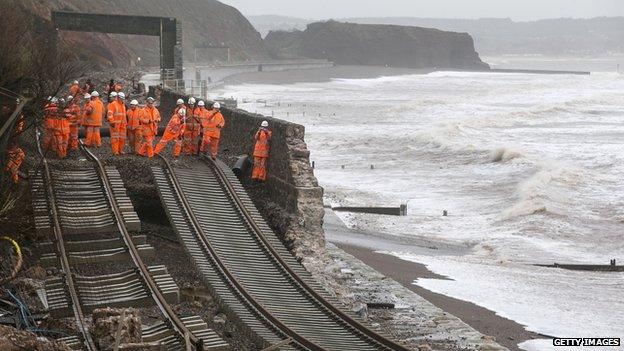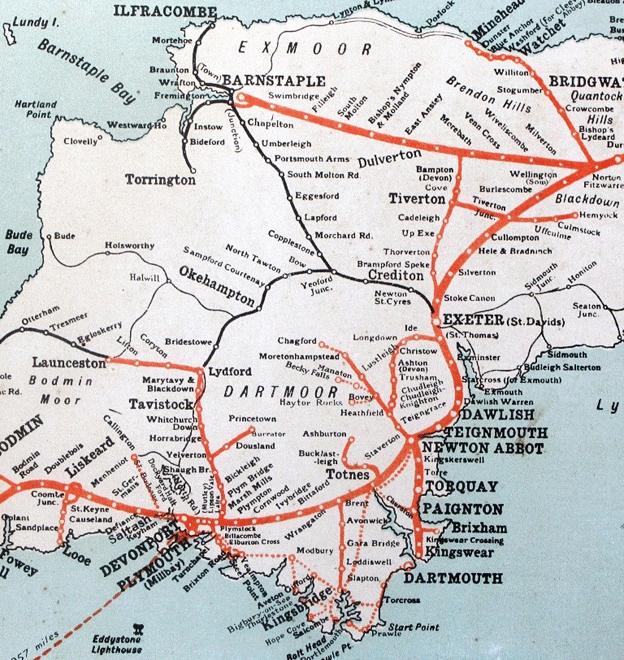How do you fix the Dawlish problem?
- Published

Repairs are getting under way, but will they be enough in the longer term?
It is not the first time the powers of nature have brought a halt to railway services running through the Devonshire seaside town of Dawlish, but many are saying it should be the last.
This week, what some have long predicted came true as huge waves uprooted and washed away great chunks of track and brought parts of the sea wall crashing down.
Over the next six weeks, work is to be carried out on this precarious section of a vital rail line that connects Devon and Cornwall to the rest of the UK.
Will this just be a sticking plaster or is the answer now to move the line inland?
Transport Secretary Patrick McLoughlin has said he will conduct a "rigorous review" of alternative rail routes to the South West of England.
Some warn it will take too long and prove too expensive to reroute this coastal section of the railway line, built by Isambard Kingdom Brunel in Victorian times.
Robin Gisby, managing director of network operations at Network Rail, says there needs to be a longer-term look at the line, however - something many rail experts are calling for.

A Great Western Railway map from the 1930s shows just how many miles of track once criss-crossed Devon and Cornwall.
One of the solutions could involve taking a step back in time and reinstating the old Tavistock line.
Until 1968, following cuts approved by chairman of the British Transport Commissioner Richard Beeching, it was possible to travel from Exeter to Plymouth via Okehampton and Tavistock on a double-tracked line. Part of it still runs as the Dartmoor Railway, which runs special services on weekends, bank holidays and school holidays.
Halted by Hitler
Another possibility could involve rerouting trains along the former Teign Valley branch line, which ran inland from Exeter before rejoining the main line at Newton Abbot. Substantial work would be needed to restore the line, which closed in 1958.

Alternatively, rail chiefs could revisit a scheme to build an entirely new route which Hitler inadvertently put paid to.
Sim Harris, managing editor of industry newspaper Railnews, explained that rerouting the line along an existing route, would be "highly feasible", but trains would have to change direction at Exeter and Plymouth, causing delays.
"There is another solution, which would have been ideal if Hitler had not got in the way," said Mr Harris. "Before the last war, the Great Western Railway bought some land, inland, between Newton Abbot and Exeter, which would have been splendid. But before they could actually do the work, war broke out. As it was nationalised after the war, the land was sold off again.
"So if it hadn't been for Hitler, we would have had that route - but that's history, and that's how it happened.
He suggests revisiting that scheme by buying a strip of land and building a new double-track railway.
The Dawlish line could then be kept as a single track serving coastal communities, but mainline services would run on the new line.
"If you close it completely, you're losing a piece of glorious railway - and places like Teignmouth and Dawlish would lose their local service," he added.
Transport infrastructure expert John Disney of Nottingham Business School said Dawlish was "an accident waiting to happen".
"It was entirely predictable that at some time the sea was going to win the 'Battle of Dawlish' and sweep away Brunel's coastline railway," he said. "It is amazing that it has lasted until 2014, due mainly to Network Rail's excellent infrastructure maintenance regime."
Looking to the future, he said that reopening and modernising the inland line through Okehampton should be considered.
Five-year project
Dr Disney said: "Long-term serious consideration must now be given to reopening an alternative inland railway line through Devon closed during the Beeching era.
"While local campaigners have been fighting for this restoration for some time, there has been little Westminster support but the tide may now be turning."
Dr Disney estimated rerouting would take five years. Using existing track would be an obvious solution - but upgrading work would have to be carried out, he added.
"When we look at current rail projects, it's not inconceivable," he said. "It wouldn't be anything like as difficult as the Crossrail project in London and wouldn't be controversial like HS2."
Too important
Transport commentator Christian Wolmar said: "I think it's time to build a new railway and ultimately this will be clear.
"I suspect the best thing is to reroute the train line through Tavistock and keep a single line through Dawlish.
"This is likely to happen again - we're getting one-in-a-hundred-year storms every year. Of course they have to repair it this time but it's too important a link for Cornwall.
"If this was the main line to Guildford, it would have been done a long time ago."
Speculating on the figures involved, he added: "If this is going to cost £50m to fix, you might as well spend £250m on building new track. In the long run, it will save money."
In 2011 when creating an alternative line was mooted, then-environment minister Lord Henley suggested it would cost £100m. He rejected this as being "far too expensive", however.
Holiday trade
Richard Clinnick, assistant editor at Rail magazine, said: "It's a situation now where this is something that seriously, seriously needs to be looked at. We could have another situation like the one we have at the moment, where Devon and Cornwall is cut off.
"There has been talk of doing away with the Dawlish line, but you can't do that. The line that is currently severed covers Dawlish and Teignmouth - and importantly, it also covers Torquay and Paignton, which are huge for the holiday trade."
With so many experts having apparently foreseen Dawlish's fate, the government will know it has some tough decisions to make about its future.
In the meantime, rail engineers will try to get trains moving again, while businesses in the region see millions of pounds of income disappear each day and rail travellers face ongoing disruption.
- Published5 February 2014
- Published7 February 2014
- Published6 February 2014
- Published6 February 2014
- Published6 February 2014
- Published6 February 2014